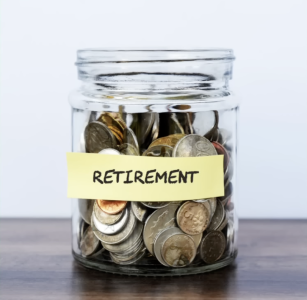Why retirement savings feel harder than ever—and how Americans are adapting
By
Veronica E.
- Replies 0
If it feels like every trip to the grocery store is quietly shrinking your savings goals, you’re not imagining it.
Many older Americans are finding that even as inflation eases on paper, the effects are still lingering in their everyday lives.
From delayed retirement plans to scaled-back expectations, concerns about rising costs continue to shape how people think about the future.
A new survey offers a clearer picture of how inflation is influencing retirement planning, especially for workers who rely heavily on their 401(k)s.
The findings reveal both challenges and encouraging signs of resilience—and offer ideas for staying the course.

According to Charles Schwab’s 2025 survey of over 1,000 401(k) participants, 57% named inflation as the number one barrier to saving for retirement.
While inflation has cooled since its 2022 peak of 9.1%, many Americans say the rising cost of living still impacts their ability to save.
In fact, just 34% of respondents now feel “very likely” to meet their retirement savings goals—down from 43% last year.
These numbers reflect growing anxiety, especially among older workers.
For many, even modest lifestyle changes have added up to delayed timelines and financial uncertainty.
Despite ongoing challenges, most Americans aren’t giving up on retirement savings.
Instead, they’re adjusting their spending habits.
According to the survey:
This suggests that even during tough times, many are committed to staying on track.
The average worker now believes they’ll need $1.6 million to retire comfortably, which is slightly lower than last year’s $1.8 million estimate.
This shift likely reflects both a more realistic view of retirement and an acceptance of needing to do more with less.
Survey participants also expect to retire around age 66, with the hope that their savings will last at least 22 years.
Gen Z workers were more optimistic—predicting retirement at age 62—though many financial planners might view that as ambitious.
Concerns over Social Security remain high.
According to the survey:
In response, many workers are turning more heavily to employer-sponsored plans.
On average, participants expect 45% of their retirement income to come from a 401(k), while Social Security is expected to make up only 18%.

It’s not all bad news. Many employers are finding ways to support workers as they navigate financial uncertainty.
According to the survey:
These changes may help workers feel more supported—and more prepared for the future.
Here are some practical strategies that may help you protect your retirement goals, even when inflation is a factor:
Here's to building a more secure future—one smart step at a time.
Let us know how you're staying focused, and share this article with someone who might appreciate the encouragement.
Read next: Thinking of using your 401(k) to pay off credit card debt? Here’s what it could really cost you

Are you adjusting your savings plan this year? Have you found creative ways to cope with rising prices? We’d love to hear how you’re navigating today’s financial challenges—especially if it helps others feel less alone.
Many older Americans are finding that even as inflation eases on paper, the effects are still lingering in their everyday lives.
From delayed retirement plans to scaled-back expectations, concerns about rising costs continue to shape how people think about the future.
A new survey offers a clearer picture of how inflation is influencing retirement planning, especially for workers who rely heavily on their 401(k)s.
The findings reveal both challenges and encouraging signs of resilience—and offer ideas for staying the course.

Many Americans are adjusting their spending and savings habits in response to rising costs. Image Source: Pexels / Monstera Production.
Inflation is still the biggest obstacle
According to Charles Schwab’s 2025 survey of over 1,000 401(k) participants, 57% named inflation as the number one barrier to saving for retirement.
While inflation has cooled since its 2022 peak of 9.1%, many Americans say the rising cost of living still impacts their ability to save.
In fact, just 34% of respondents now feel “very likely” to meet their retirement savings goals—down from 43% last year.
These numbers reflect growing anxiety, especially among older workers.
For many, even modest lifestyle changes have added up to delayed timelines and financial uncertainty.
Also read: Boost your Social Security income in retirement with these three smart strategies
How Americans are adjusting their habits
Despite ongoing challenges, most Americans aren’t giving up on retirement savings.
Instead, they’re adjusting their spending habits.
According to the survey:
- 4 in 10 respondents are cutting back on expenses to keep their 401(k) contributions stable
- Only 11% have reduced their retirement contributions due to economic pressure
- Fewer people are withdrawing from their accounts early, with hardship withdrawals and loans dropping to 21%, compared to 26% last year
This suggests that even during tough times, many are committed to staying on track.
Also read: Could your retirement be delayed? Find out if sweeping new age changes will impact you and 257 million Americans
How much is enough to retire?
The average worker now believes they’ll need $1.6 million to retire comfortably, which is slightly lower than last year’s $1.8 million estimate.
This shift likely reflects both a more realistic view of retirement and an acceptance of needing to do more with less.
Survey participants also expect to retire around age 66, with the hope that their savings will last at least 22 years.
Gen Z workers were more optimistic—predicting retirement at age 62—though many financial planners might view that as ambitious.
Also read: Thinking of working in retirement? Here’s where seniors are thriving
Social Security confidence continues to drop
Concerns over Social Security remain high.
According to the survey:
- More than half of respondents aged 45 to 75 feel less confident in Social Security than they did five years ago
- 58% worry that benefits will be reduced
- Projections show that a dual-earner couple retiring in 2033 could lose about $18,100 in annual benefits, a 24% decrease compared to today
In response, many workers are turning more heavily to employer-sponsored plans.
On average, participants expect 45% of their retirement income to come from a 401(k), while Social Security is expected to make up only 18%.

Many Americans are rethinking how much they need to save for retirement as inflation reshapes long-term financial goals. Image source: Pexels / CBS News.
Also read: The surprising truth about borrowing from your 401(k)—what you need to know to avoid financial disaster
Some employers are stepping up
It’s not all bad news. Many employers are finding ways to support workers as they navigate financial uncertainty.
According to the survey:
- About 1 in 3 respondents received a pay raise
- 15% reported a higher 401(k) match
- Others benefited from bonuses, improved benefits, or health savings account contributions
These changes may help workers feel more supported—and more prepared for the future.
Also read: The surprising truth about borrowing from your 401(k)—what you need to know to avoid financial disaster
Tips to stay on track with your savings
Here are some practical strategies that may help you protect your retirement goals, even when inflation is a factor:
- Stick with your contributions: Even holding steady can make a big difference over time.
- Trim your budget strategically: Small savings on groceries or utilities can add up.
- Delay claiming Social Security if possible: Waiting can increase your monthly benefit.
- Diversify your portfolio: Don’t rely too heavily on one asset type.
- Use catch-up contributions: If you’re over 50, take advantage of increased contribution limits for 401(k)s and IRAs.
- Talk to a financial advisor: A second opinion can uncover opportunities or risks you may have overlooked.
Here's to building a more secure future—one smart step at a time.
Let us know how you're staying focused, and share this article with someone who might appreciate the encouragement.
Read next: Thinking of using your 401(k) to pay off credit card debt? Here’s what it could really cost you
Key Takeaways
- A 2025 Charles Schwab survey found that 57% of workers see inflation as the top barrier to saving for retirement.
- Despite rising costs, most Americans are keeping 401(k) contributions steady and avoiding early withdrawals.
- Confidence in Social Security continues to decline, with many expecting reduced benefits in the next decade.
- The average worker believes $1.6 million is needed for retirement, with retirement age expectations around 66.
Are you adjusting your savings plan this year? Have you found creative ways to cope with rising prices? We’d love to hear how you’re navigating today’s financial challenges—especially if it helps others feel less alone.






